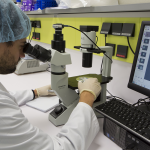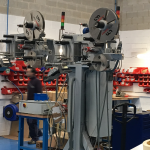The company Técnicas Avanzadas en Mecanización de Modelos makes a clear commitment to innovation as the cornerstone of its project
Since it was established last April, the company Técnicas Avanzadas en Mecanización de Modelos (TECCAM, S.L.) has been carrying out an innovative business project in the production of models for smelting pieces for various industrial sectors. The commitment of this company located in Zamudio is based, fundamentally, both on the use of last generation technology and on opening up to foreign markets through the implementation of an ambitious internationalization process.
TECCAM is mainly dedicated to the production of polystyrene models that are used to make later the final moulds in the foundry, used for the manufacture of unitary pieces. Unlike other materials such as wood or resins that are used to manufacture serial parts, polystyrene is used to make what is called ‘lost model’, that is, usable for a single piece, which is usually a prototype or a unit project.
Nowadays, the biggest part of TECCAM’s activity is addressed to the automobile sector, although the firm also meets demands from other sectors such as machine-tool sector, the mould industry, the cement sector or the energy industry, in order to have sufficiently diversified its production.
The process of undertaking
Raúl Espinosa, founding partner of TECCAM, accumulates more than twenty years of experience in the sector of foundry moulds. He decided to create the company, together with an investment partner and with the support of Seed Capital Bizkaia, observing that the demand was changing and that most of the traditional firms were not prepared to meet the new demands of the markets. “We saw – he points out – that the sector needed to introduce new technology, that it was necessary to have the latest generation machines and that, in addition, it was necessary to internationalize, because nowadays we compete at European level”.
The reality has corroborated the forecasts of this entrepreneur since, from the beginning, the activity of the company has been well received by the market. “Customers have welcomed our initiative very favourably from the beginning, because they have appreciated the strong commitment we have made in innovation and production capacity to keep up with current market demands”, explains Espinosa.
“The beginning has been hard”, he recalls, “since we had to overcome halts because, inevitably, optimizing the manufacturing process, no matter how modern the machinery is, requires time; but we are gradually picking up cruising speed and we estimate that in one year we will reach the optimum level of production”.
Not surprisingly, TECCAM has among its clients such outstanding automotive firms as Gestamp, Batz or Matrici; it is a supplier to the machine tool and foundry sector which, in turn, works with international clients and has become a direct supplier to the Volkswagen Group.
Modernization
At the same time that it responds to the market demand, TECCAM dedicates important efforts to innovation and internationalization as axes to differentiate its offer. “Our R&D department – indicates Espinosa – is experimenting with new tools and materials to achieve higher quality surface finishes that respond to the demand we see in the market. We are also trying to improve all our processes to achieve shorter manufacturing times than those of our competitors, since the automotive sector requires them”. Furthermore, in order to expand its activity in European markets, as a priority, TECCAM has decided to incorporate into its structure a commercial department that will start operating in early 2017.
Adaptation to market demands
The automotive sector is going through a period of high demand, but also of strong competition that requires supplier companies to grow, both in technical means and in staff training, to be able to deal with the highest quality possible the high-volume orders made by international clients. “Looking to the future”, says Espinosa, “we understand that our challenge is to achieve this type of growth and also diversify production, because the automotive sector is very cyclical; in fact, we already allocate 30% of our production to other sectors”.
TECCAM intends to successfully face the changes that are expected in the automotive sector. “It is convenient to be alert – they advance – regarding what materials are going to be developed in the future” with the arrival and spread of electric vehicles, which will introduce “important changes” in the body and chassis manufacturing processes. “We believe that in the next 15 years fossil fuel vehicles will have practically disappeared and that there will be an evolution in weights and manufacturing materials. We see it necessary to evolve in line with what the sector is demanding and, therefore, we are working to adapt to the great changes that we expect will take place in the automotive sector”.




